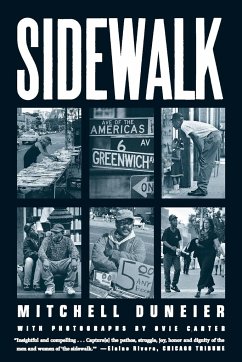Sidewalk is about a group of men -- Hakim, Marvin, Mudrick, and Ishmael, among others -- who sell books, magazines, and recycled trash on Sixth Avenue in Greenwich Village. Most of them are black, some are homeless and have prison records and histories of addiction; they are the targets of politicians, moralists, greedy business owners, and the police. Mitchell Duneier spent much of five years in their company: working at their vending tables, hearing their stories, and observing the roles they play. He came away convinced that these men, in their struggles to better themselves, are fundamental to the well-being of the city. Featuring Ovie Carter's powerful photographs, an insightful Afterword by longtime book vendor Hakim Hasan, and a new Epilogue, Sidewalk is already recognized as the best book about street life since Jane Jacobs's The Death and Life of Great American Cities.
An exceptional ethnography marked by clarity and candor, Sidewalk takes us into the socio-cultural environment of those who, though often seen as threatening or unseemly, work day after day on "the blocks" of one of New York's most diverse neighborhoods. Sociologist Duneier, author of Slim's Table, offers an accessible and compelling group portrait of several poor black men who make their livelihoods on the sidewalks of Greenwich Village selling secondhand goods, panhandling, and scavenging books and magazines. Duneier spent five years with these individuals, and in Sidewalk he argues that, contrary to the opinion of various city officials, they actually contribute significantly to the order and well-being of the Village. An important study of the heart and mind of the street, Sidewalk also features an insightful afterword by longtime book vendor Hakim Hasan. This fascinating study reveals today's urban life in all its complexity: its vitality, its conflicts about class and race, and its surprising opportunities for empathy among strangers. Sidewalk is an excellent supplementary text for a range of courses: INTRODUCTION TO SOCIOLOGY: Shows how to make important links between micro and macro; how a research project works; how sociology can transform common sense. RACE AND ETHNIC RELATIONS: Untangles race, class, and gender as they work together on the street. URBAN STUDIES: Asks how public space is used and contested by men and women, blacks and whites, rich and poor, and how street life and political economy interact. DEVIANCE: Looks at labeling processes in treatment of the homeless; interrogates the "broken windows" theory of policing. LAW AND SOCIETY: Closely examines the connections between formal and informal systems of social control. METHODS: Shows how ethnography works; includes a detailed methodological appendix and an afterword by research subject Hakim Hasan. CULTURAL ANTHROPOLOGY: Sidewalk engages the rich terrain of recent developments regarding representation, writing, and authority; in the tradition of Elliot Liebow and Ulf Hannerz, it deals with age old problems of the social and cultural experience of inequality; this is a telling study of culture on the margins of American society. CULTURAL STUDIES: Breaking down disciplinary boundaries, Sidewalk shows how books and magazines are received and interpreted in discussions among working-class people on the sidewalk; it shows how cultural knowledge is deployed by vendors and scavengers to generate subsistence in public space. SOCIOLOGY OF CULTURE: Sidewalk demonstrates the connections between culture and human agency and innovation; it interrogates distinctions between legitimate subcultures and deviant collectivities; it illustrates conflicts over cultural diversity in public space; and, ultimately, it shows how conflicts over meaning are central to social life.
Hinweis: Dieser Artikel kann nur an eine deutsche Lieferadresse ausgeliefert werden.
An exceptional ethnography marked by clarity and candor, Sidewalk takes us into the socio-cultural environment of those who, though often seen as threatening or unseemly, work day after day on "the blocks" of one of New York's most diverse neighborhoods. Sociologist Duneier, author of Slim's Table, offers an accessible and compelling group portrait of several poor black men who make their livelihoods on the sidewalks of Greenwich Village selling secondhand goods, panhandling, and scavenging books and magazines. Duneier spent five years with these individuals, and in Sidewalk he argues that, contrary to the opinion of various city officials, they actually contribute significantly to the order and well-being of the Village. An important study of the heart and mind of the street, Sidewalk also features an insightful afterword by longtime book vendor Hakim Hasan. This fascinating study reveals today's urban life in all its complexity: its vitality, its conflicts about class and race, and its surprising opportunities for empathy among strangers. Sidewalk is an excellent supplementary text for a range of courses: INTRODUCTION TO SOCIOLOGY: Shows how to make important links between micro and macro; how a research project works; how sociology can transform common sense. RACE AND ETHNIC RELATIONS: Untangles race, class, and gender as they work together on the street. URBAN STUDIES: Asks how public space is used and contested by men and women, blacks and whites, rich and poor, and how street life and political economy interact. DEVIANCE: Looks at labeling processes in treatment of the homeless; interrogates the "broken windows" theory of policing. LAW AND SOCIETY: Closely examines the connections between formal and informal systems of social control. METHODS: Shows how ethnography works; includes a detailed methodological appendix and an afterword by research subject Hakim Hasan. CULTURAL ANTHROPOLOGY: Sidewalk engages the rich terrain of recent developments regarding representation, writing, and authority; in the tradition of Elliot Liebow and Ulf Hannerz, it deals with age old problems of the social and cultural experience of inequality; this is a telling study of culture on the margins of American society. CULTURAL STUDIES: Breaking down disciplinary boundaries, Sidewalk shows how books and magazines are received and interpreted in discussions among working-class people on the sidewalk; it shows how cultural knowledge is deployed by vendors and scavengers to generate subsistence in public space. SOCIOLOGY OF CULTURE: Sidewalk demonstrates the connections between culture and human agency and innovation; it interrogates distinctions between legitimate subcultures and deviant collectivities; it illustrates conflicts over cultural diversity in public space; and, ultimately, it shows how conflicts over meaning are central to social life.
Hinweis: Dieser Artikel kann nur an eine deutsche Lieferadresse ausgeliefert werden.









